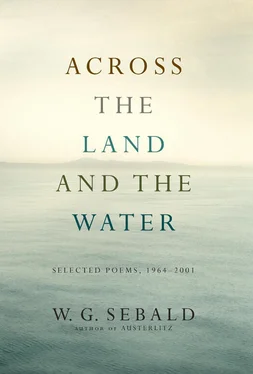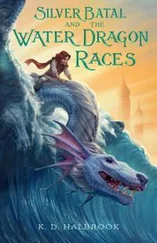40 Poor Summer in FranconiaÜLW. Colorado beetle: by 1936 the westward spread of the Colorado potato beetle through continental Europe had reached Germany, destroying crops as it went. Widespread infestation continued until the 1950s. Five lines of the poem are incorporated into the final section of After Nature , op. cit. (p. 89).
41 SolnhofenÜLW. Title: a small town in Franconia (a region of Bavaria). The Solnhofen limestone lagerstätte (sedimentary deposit) has supplied some of the most significant fossils ever found, including the Jurassic Archaeopteryx, the so-called Urvogel , or “first bird.” See also the first lines of “Dark Night Sallies Forth,” in After Nature , op. cit. (p. 81).
42 Leaving BavariaÜLW, H. Hindenberg’s gray-green millions: by November 1923, hyperinflation had rendered the German reichsmark valueless and postage stamps had to be overprinted daily with surcharges of up to ten billion marks. The term null ouvert derives from the popular German card game Skat. Null Ouvert is the only game where the “declarer” wins if he manages to lose every trick. gondola: the term for the cabin of an airship. Dionysius: the patron saint of Paris, St. Denis, whose tradition and martyrdom involve his carrying his head under one arm, is known in German as St. Dionysius. There is a statue commemorating St. Dionysius in Bamberg Cathedral, probably because Pope Clemens II, who is buried there, died on St. Denis’s commemoration day.
43 Something in My EarSL, ÜLW, H.
44 PanaceaSL, ZET, ÜLW, H. Much of this poem occurs in the second section of “Dark Night Sallies Forth” in After Nature , London: 2003 (p. 88).
45 MithraicSL, ZET, ÜLW, H. Title: Mithra was a Zoroastrian divinity of the oath. Zarvan: the Zoroastrian time-father creator, the father too of Ahriman and Ormuzd, recurring figures in Sebald’s work. The Zurvanist creation myth holds that Zurvan, or Zarvan, promised to sacrifice, or pray, for a thousand years for descendants (who would then be able to create everything in the world). Before the period was finished, however, he began to have doubts that his wishes would be fulfilled, and at that moment he conceived the twins Ahriman (for doubt) and Ormuzd (for sacrifice). The sea-goat is Capricorn, created when Pan leaped into the sea to escape the Titan Typhon, growing a fish’s tail as he did so. The sea-goat is a symbol of renewed vitality and new beginnings. The oldest world egg myth, a symbol for the beginning of all things, goes back to the Sanskrit scriptures.
46 MemoSL, ZET, ÜLW, H.
47 Barometer ReadingSL, ÜLW, H. ignoring their ladders: weather frogs (tree frogs) were kept in preserve glasses with some water in the bottom and a small ladder. If the weather was changing for the better, the frog would climb the ladder; if rain was imminent, the frog descended the ladder. Propertius: Sextus Propertius, Latin poet (ca. 50–15 BCE). In book 3 of his Elegies , Phoebus advises the poet: “Why have your pages left their set course? / Do not overload the boat of your skill. / With one oar skim the water, with the other the sand. / You will be safe: the storm is out at sea” (my translation).
48 K.’s EmigrationSL, ZET, ÜLW, H. Bohemian Switzerland , the High Tatras , and Franzensbad are all places frequented by Kaf ka. The final stanza cites a postcard, written by Kafka (dated June 1921) from Matliary in the High Tatras, to his parents, who were taking a Kur in Franzensbad. The postcard picture shows Kaf ka surrounded by fellow patients and staff. The “you” and “your”—at least in the context of Kaf ka’s postcard — addresses Kaf ka’s parents.
49 Through Holland in the DarkPT, ÜLW, H. Kaiser Wilhelm II, sometimes referred to colloquially as “Kaiser Willem,” abdicated as German emperor and king of Prussia in November 1918 and went into exile in the Netherlands, where he lived in the town of Doorn until his death in 1941. The “Willem II” brand of cigars, however, was named after Prince William II of Orange (1626–50).
50 AbandonedÜLW. Goethe’s abominable nature: entry for January 31, 1912, in Kaf ka’s diary: “Wrote nothing. Weltsch brings books on Goethe that leave me in a distracted and useless state of excitement. Plan for an essay: ‘Goethe’s Abominable Nature.’ Fear of the two-hour walk I’ve started taking in the evenings” (my translation).
51 MölkerbasteiSL, ZET, ÜLW, H. Title: Beethoven lived in the Pasqualati House, at Mölkerbastei 8 in Vienna. polished: a pun is lost in translation; the German has gewienert , “polished,” which contains the word wienern , to speak with a Viennese accent. chair: Beethoven sat at the piano in a chair, not on a piano stool. From the tidy room, through the missing chair to the proviso , it is clear that the museum must not be disturbed. History must be kept tidy. Beethoven is allowed in at night, provided his compositions are more or less inaudible.
52 A Galley Lies off HelsingborgÜLW. Title (“Liegt eine Galeere bei Helsingborg”): Sebald is quoting a quotation. Heinrich von Kleist cites an entry from no. 997 of the “Privilegierte Liste der Börsenhalle” (12 October 1810) in his curious article entitled “Miscellen” (“Miscellany”), published in the Berliner Abendblätter (15 October 1810), a daily newspaper of which he was editor. One of three short entries in the “Miscellen” ran as follows: “Se. Hoheit der Kronprinz von Schweden ist in Hamburg angekommen, und es liegt eine Galleere ( sic ) bei Helsingborg, um ihn zugleich bei der Überfahrt zu begrüßen” (“His Highness the Crown Prince of Sweden has arrived in Hamburg, and a galley lies off Helsingborg to welcome him when he crosses”). Kleist’s reduction of an official announcement in a Hamburg newspaper to a seemingly absurd detail deliberately placed out of context had satirical intent. See also Roland Borgards: “Experimentelle Aeronautik. Chemie, Meteorologie und Kleists Luftschiffkunst in den ‘Berliner Abendblättern,’ ” in Kleist-Jahrbuch 2005 , ed. Günter Bamberger und Ingo Breuer, Stuttgart: 2005 (p. 156). The port of Helsingborg in Sweden faces the Danish town of Helsingør, the Elsinore of Shakespeare’s Hamlet , across the Öresund Strait.
53 Holkham GapPT, SL, ÜLW, H. Title: on the Norfolk coast between Blakeney Point and Wells-next-the-Sea. The sea lion was Operation Sea Lion (1940), Hitler’s only serious plan for the invasion of Britain; following British success in the Battle of Britain, it was continually postponed. Uncle Toby wishes for war in chapter 32 of book 6 of Laurence Sterne’s Tristram Shandy .
54 NorfolkSL, ZET, ÜLW, H. The physical (or, rather, metaphysical) attitude of the passenger, who is sailing backwards … with banished time , is reminiscent of Walter Benjamin’s “angel of history”: the “storm [from Paradise] irresistibly propels him into the future to which his back is turned, while the pile of debris before him grows skyward” ( Illuminations , trans. Harry Zohn, London: 1973 [p. 260]). The reason for the poem’s description of Norfolk as a Louisianian landscape is obscure. If the adjective refers to the U.S. state Louisiana, the comparison is not entirely unfounded; the American state has some six thousand miles of navigable waterway, including three thousand miles of canals, while the 1961 edition of the Encyclopaedia Britannica (published five to ten years before the poem was written) states that the “low regions” of Louisiana, consisting largely of alluvial lands and reclaimable swampland, make up half of the entire state. Egyptian: Many years after the poem was written, the narrator in chapter 4 of Sebald’s East Anglian peregrination The Rings of Saturn would remember Denis Diderot’s description of Holland as “the Egypt of Europe,” where one could sail through the fields in a boat. Perhaps Sebald had in mind the renowned Norfolk “wherry” Hathor , designed in 1905 using Egyptian hieroglyphics and mythological images. Wherries, of which only half a dozen survive today, may be said to resemble Egyptian feluccas.
Читать дальше












